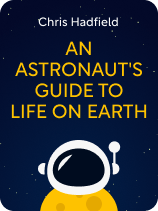

This article is an excerpt from the Shortform book guide to "An Astronaut's Guide to Life on Earth" by Chris Hadfield. Shortform has the world's best summaries and analyses of books you should be reading.
Like this article? Sign up for a free trial here.
Why should you expect the worst to happen? What’s the importance of preparing for a downside?
Whether or not you’re beginning a new experience, you need to plan for every possible outcome. Chris Hadfield’s book An Astronaut’s Guide to Life on Earth claims this is because you don’t want to be overwhelmed if the worst possible result happens.
Discover why expecting the worst is actually for the best.
Plan for the Worst Possible Outcomes
Even when you’re no longer new to an endeavor, you still encounter new experiences all the time. Hadfield argues that any time you’re beginning a new experience, you should expect the worst outcomes and plan how you’ll handle them. He learned this lesson from undergoing hours of on-Earth astronaut preparation in which trainers ran him and his colleagues through life-threatening simulations, such as how to handle a system failure on the space station.
(Shortform note: In a MasterClass that Hadfield offers on the topic of space exploration, this lesson seems to form a central principle of his curriculum. He summarizes this idea with the phrase “the more you know, the less you fear.”)
In this section, we’ll explore three interrelated reasons why Hadfield believes you should plan for the worst possible outcomes.
Reason 1: You’ll Be More Effective Under Pressure
First, Hadfield claims that when you plan for the worst possible outcomes, you’re more effective under pressure. Any time you plan for and practice solutions to negative scenarios in advance, these solutions embed themselves in your mind. If disaster strikes (such as the temporary blindness incident), you’ll easily remember your plans, which will help you feel prepared and calm under pressure. For example, Hadfield found that hours of on-Earth training for handling fires aboard the ISS prepared him and his team to respond calmly and methodically when multiple fire alarms went off.
(Shortform note: In Chasing Space, Leland Melvin offers an actionable strategy that may help you put Hadfield’s advice into practice. Melvin claims that thoroughly visualizing the steps of how you’ll handle a situation (such as a worst-case scenario) prepares you to handle it. He learned this strategy when he was an NFL wide receiver—he visualized football plays in advance of games. He adds that this same strategy helped him when he was a NASA astronaut tasked with operating Canadarm to install a research lab at the ISS.)
Reason 2: You’ll Experience Less Anxiety
Second, Hadfield argues that planning for the worst possible outcomes quiets your anxiety. According to Hadfield, anxiety arises when you’re uncertain what will happen, and you worry you’ll have no control if a crisis arises. By anticipating negative scenarios and planning how to prevent or address them, you increase your certainty that you can handle crises. This boosts your sense of control and prevents you from spending your time constantly worrying that you won’t be able to handle unexpected crises.
Reason 3: You’ll Appreciate Positive Moments
Third, Hadfield claims that expecting the worst allows you to be more present during positive moments. Because planning for negative scenarios quiets your anxiety, you have more mental and emotional energy to focus on the positive aspects of an experience, such as the wonders of space travel.
Eileen Collins’ Additional Insights on Handling Worst-Case Scenarios
In her memoir Through the Glass Ceiling to the Stars, former astronaut Eileen Collins echoes Hadfield’s advice about the importance of expecting the worst. When describing her first launch into space, Collins provides additional insights on 1) quieting your anxiety during high-risk moments; and 2) why feeling present may be harder for some people. Let’s further examine these two insights and explore how you can apply Collins’ advice to your life on Earth.
1) Quieting your anxiety during high-risk moments: Collins suggests that keeping yourself busy reduces your anxiety during moments in which a worst-case scenario is likely to occur. According to Collins, during her first launch into space, she was too busy monitoring the shuttle’s systems to notice that the shuttle was at the same point in its upwards journey that the Challenger was nine years earlier when it disintegrated, killing all seven astronauts aboard. If she’d paused in completing her checklist to consider that her shuttle could’ve encountered a similar fate, she might have panicked and jeopardized their success.
How can you quiet your anxiety on Earth when you’re facing a high-risk, high-anxiety moment? Like Collins, consider making a checklist of helpful actions that can occupy your mind. For instance, imagine you’re nervous about your pregnancy. Consider making a list of tasks you can complete around the house to keep you busy, such as setting up the baby’s room and packing a “to-go bag” that you can bring to the hospital.
2) Why feeling present for positive moments may be harder for some: Second, Collins notes that her identity as a female astronaut placed additional pressure on her to succeed in her career. This pressure made it harder for her to be present for some positive moments. For instance, after the first shuttle she was on entered zero gravity, she was occupied with thoughts about how she was the first woman to pilot a space shuttle. She read her checklists over and over, convinced that her success in completing her checklists would shape future female astronauts’ opportunities. One of her colleagues then nudged her, reminding her to look out the window and enjoy her first breathtaking view of Earth from afar.
Collins’ anecdote suggests that you may need to rely on your team to help you appreciate positive moments. You can apply this advice to your life by telling your teammates or loved ones that you’d like them to remind you to be present any time you’re consumed with worry. For instance, returning to our earlier example, you can tell your partner, family, and friends to notice when you’re worried and remind you to appreciate the wonders of pregnancy, such as the amazing ways your body changes to support your baby’s life.

———End of Preview———
Like what you just read? Read the rest of the world's best book summary and analysis of Chris Hadfield's "An Astronaut's Guide to Life on Earth" at Shortform.
Here's what you'll find in our full An Astronaut's Guide to Life on Earth summary:
- Chris Hadfield's experience of becoming an astronaut
- The five life lessons Hadfield learned in his role as an astronaut
- Why you should find joy in everyday life rather than looking forward to milestones






